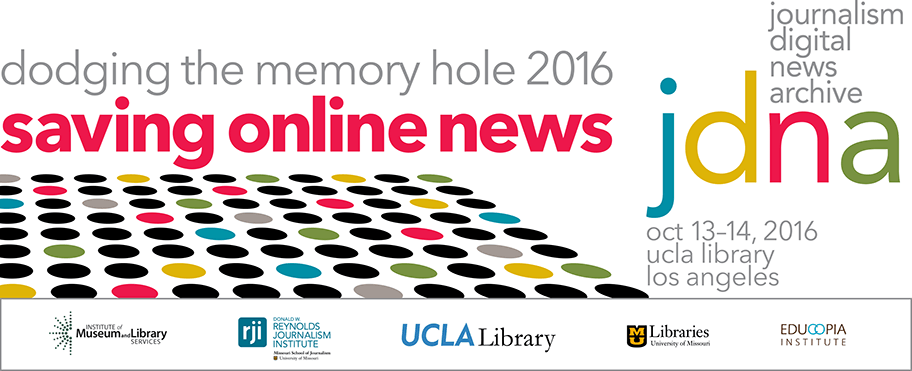
Cynthia Joyce: Lightning rounds: Keyword ‘Katrina’: Re-collecting the unsearchable past
Scroll to view transcript
CYNTHIA JOYCE: [00:12] This has been a really awesome conference for me to find all the — it’s the right rabbit hole, as I’ve been texting people, for me to fall into, because I had worked on this project a couple of years ago, before I gave any thought to digital archiving, but then it was through the process of this that I became a convert on the need for this stuff.
JOYCE: [00:49] So, a couple of years ago — I’ve been a journalist for 20 years, I teach now at the University of Mississippi — I have mostly been on the web since 1995. I was at Salon, and then later I was at Nola.dot com. Briefly, after Katrina, I was living in New Orleans in 2005 and then, later, ended up working for NBC News and MSNBC.com. So, I call myself a “naturalized citizen” of the web universe. I’m not a digital native, but I’ve spent a lot of time there.
JOYCE: [01:20] If you take nothing else away from this little talk, if you don’t know the Detectorists, it’s a really lovely, little BBC show that’s about metal detectors, and they had a quote that said, “If it hasn’t been forgotten, then I’m not interested,” which I thought was could be a slogan for this entire thing.
JOYCE: [01:36] So, in 2005, I was in New Orleans and I lived through Katrina, I was one of the lucky ones. I was not plucked off of a rooftop by a helicopter, but I had a car, I had friends, I had a computer; which meant that I spent many months on that computer, online, and reading blogs and reading what people were talking about and thinking about and struggling with. And I had one as well.
JOYCE: [02:03] And that whole sort of layer, of that experience, I didn’t know was already going to be gone when I went back looking for it. But, when I was in the newsroom, then in 2010, I was working at NBC, and I watched the process by which we were trying to cover the anniversary. And I watched everybody, as they just went back through their old tapes. So, everybody was basically looking at their own archives, and their own reporting that they had done, to go back and then memorialize this event. And I thought, “This was not my experience of the storm.” I turned the TV off, pretty much within 24 hours of the whole thing falling apart. I couldn’t bear to watch it.
JOYCE: [02:43] So, my experience of the storm was very much lived in the web, in that one sedimentary layer of the web that was 2005. So then anticipating the tenth anniversary of the storm, I was thinking, “I can’t bear to watch the highlight reel of Katrina, again. We’re going to do this every five years.” So, I went back to try to curate my own narrative of that. And that became this book, which is basically more than 75 writers, bloggers, citizen journalists; and I created sort of a timeline narrative of that event.
JOYCE: [03:19] And I would appeal to all of those of you, who are trying to figure out ways to engage people in newsrooms, is appeal to the ego of reporters; which is, actually, a really good way in. And, you know, go to them and say, “Hey, Dan Baum at The New Yorker, your stuff is gone. What about we bring this back up?” Anniversaries provide a really great opportunity. Newsrooms kind of hate them, because they have to cover them and they don’t know how to come back at them.
“Please Forward” is the name of the book, and I feel like it’s a really good case study. Thanks to the Archive It folks and Jefferson Bailey’s team, it now exists online. I don’t think that, if I had just gone to news organizations and said, “Hey! I’ve moved a bunch of stuff from online, over here, to another place online,” I don’t think anybody would have cared. But because we, sort of pulled it out and excavated it and created something, then this turned into a bunch of other things, radio and podcast, and with the people involved. Anyway, thank you for your more than three minutes.
